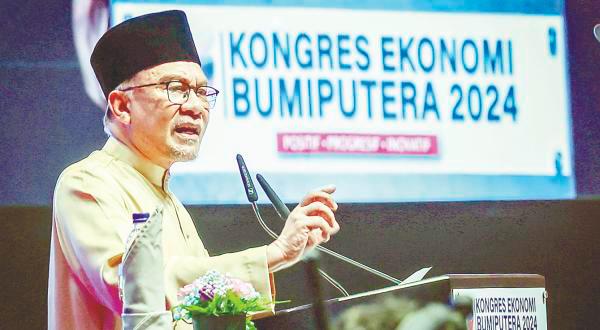MANY Malaysians have asked: “Can PMX reinvent the bumiputera construct?” The answer following the latest Bumiputera Economic Congress is not clear but there is some optimism that a new direction of economic development in Madani economics holds promise for not only the bumiputera but also all Malaysians.
When announcing the event, Prime Minister Datuk Seri Anwar Ibrahim noted that a more inclusive approach to addressing the bumiputera economy will lead to resolving issues affecting other communities.
“I hope ACCCIM (Associated Chinese Chambers of Commerce and Industry of Malaysia) is ready to discuss (such issues) because a more inclusive approach means that, in talking about the bumiputera economy, issues involving small and medium-sized enterprises or the poor among the Indian community will be addressed together.”
The leading congress speakers have taken up his challenge in different ways.
Equitable opportunity
Bursa Malaysia Bhd chairman Abdul Wahid Omar, a former minister in the Prime Minister’s Department in charge of economic planning, not only called for more assistance to help bumiputera businesses.
He proposed the introduction of an Equitable Opportunity Act to ensure that all citizens are given a fair shot at jobs and business opportunities.
According to him, if the policy is implemented in the private sector, it can foster competition in the business and corporate sectors, where its ownership is imbalanced among communities.
This Act can be useful only if it is applied transparently and without discrimination across the entire economy and society. Such legislation is necessary in the civil service, which is the biggest employer in the country. Here, there has been much concern, with not only racial imbalance but also allegations of unfairness in employment.
As new legislation will take time to implement, a start can be made by applying the equal opportunity principle to businesses and companies that the government controls directly through Khazanah, Ministry of Finance Inc, Kumpulan Wang Persaraan (Diperbadankan) and Bank Negara Malaysia, or where government-linked investment companies (GLICs) and/or other federal and state government-linked agencies collectively have a controlling stake or even a minor stake.
Government-linked companies (GLCs)/GLICs are the main and strategic service providers for electricity, telecommunication, postal, airlines, airports, public transport, water, sewerage, banking and financial services, and as of 2022 made up of about RM445 billion in the capital market and 25% of Bursa Malaysia’s market share. They can and should be the role model for employment in the private sector.
The immediate implementation of the equal opportunity principle will not only enhance GLCs/GLICs’ mandate in nation-building and improve corporate governance but will also enable them to become more competitive, thus enabling them to have a more positive impact on the country’s socioeconomy.
Bumiputera Economic Transformation Initiative
Deputy Prime Minister Datuk Seri Dr Zahid Hamidi called for a new Bumiputera Economic Transformation Initiative (BETI), which would benefit all Malaysians.
Among the Umno president’s three pledges in BETI is a national endowment to help lower-income bumiputera access education and health services, raising bumiputera participation in the industrialisation of the agricultural sector, and the establishment of a bumiputera land corporation to boost land ownership among the community.
According to him: “These three main goals are to ensure that policies and implementation of the country’s economic agenda not only ensure the involvement and rights of the bumiputera but at the same time, ensure that there is synergy with the non-bumiputera.
“Synergy between the races is extremely important in stimulating economic activity,” he said.
While the new agenda is pro-bumiputera, Zahid gave the assurance that the rights of non-bumiputera would be protected. Many outside the congress meeting welcomed this assurance.
New empowerment agenda
In his closing speech, Anwar outlined three resolutions to drive the aspirations of all segments of society. They involve efforts to strengthen the country’s economic pillars, enhance governance and the country’s institutions and uphold social justice.
“The resolution must focus on several key drivers, including enhancing competitiveness, increasing scaling, improving and maintaining equity ownership, creating wealth, developing talent, increasing income and eradicating hardcore poverty.
He further announced that all decisions and discussions from the congress will be looked into to be translated into the New Empowerment Agenda for Bumiputeras, which will be formulated for the next 10 years and launched in June.
Meanwhile, he approved RM1 billion to fund projects aimed at creating a bumiputera entrepreneurial class.
According to him: “The biggest weakness of the bumiputera is the new generation of entrepreneurs. Thus, I shall delegate through GLCs and GLICs the setting up of a big fund specifically for the realisation and development of a bumiputera entrepreneur generation, with RM1 billion approved.”
He also approved a billion ringgit in micro-credit to help bumiputera micro and small businesses, which he said would prioritise women, youths and armed forces veterans venturing into businesses.
Towards a Malaysian Economic Congress
The most inclusive and forward-looking feedback to the congress has come from former federal minister, Datuk Zaid Ibrahim, who called for a Malaysian Economic Congress to find ways to resolve issues related to the economy, governance and corruption. Picking up on a proposal by parliamentarian Hassan Abdul Karim, Zaid noted in his Facebook post:
“What we need is a Malaysian Economic Congress. An honest congress representing all Malaysians who are serious about finding answers to the country’s problems.”
The former law minister cited the example of the plight of fishermen. He said since 1970, close to RM80 billion had been spent on the fisheries industry yet over 100,000 fishermen were among the poorest in the country.
Zaid also said some economists projected that Malaysia has lost RM2.6 trillion due to corruption over the past 40 years.
“The people want to know where the sources of the leakages are and how to plug them and put the country back on an even keel.”
He said there were countless problems which remain hidden due to a lack of access to government reports and data protected by the Official Secrets Act.
“We need a congress where the answers to our woes are not predetermined by dishing out RM2 billion or more, even before the resolutions are read.
“We need a Congress where thoughtful solutions are found through careful deliberations so that large-scale pilferage can be stopped.”
Zaid said the people and leaders must take the country’s problems more seriously and “start asking questions”.
“Our leaders must be willing to change their flamboyant ways and discard failed solutions. Please take the problems of the rakyat more seriously.”
Lim Teck Ghee’s Another Take is aimed at demystifying social orthodoxy. Comments: letters@thesundaily.com










